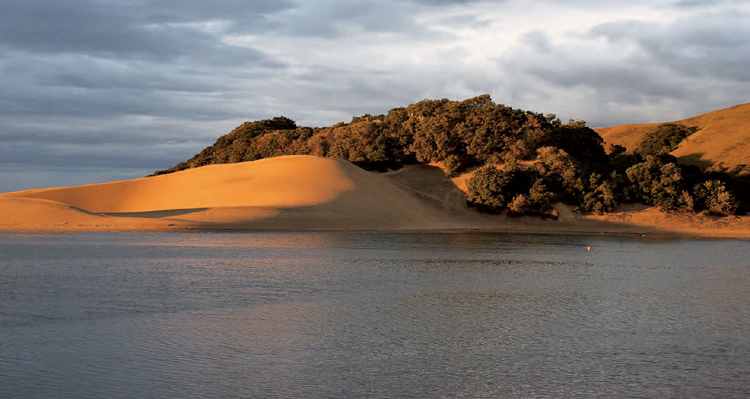
The Wild Coast holds evocative holiday memories for thousands of South Africans, many of whom first experienced the coastline and its family hotels as toddlers.
The Wilmot clan has been coming to the Morgan Bay Hotel, north of East London, for nearly six decades. These days, Mrs Dodo Wilmot meets her US-based son here for two weeks in the year, and they always take Room Two, in keeping with an unbreakable family tradition. And woe betide the dining room that doesn’t open exactly on time.
“Mrs Wilmot will stand there, impatiently tapping her foot, if we’re a minute late,” laughs Richard Warren-Smith, whose grandfather built the much-loved hotel just after World War II. Richard knows, however, that clientele like the Wilmot family is where the real gold lies in the hospitality business: people who enjoy the place so much they’re already booking for next year.
I remember the warmth of a regular family hotel-hideaway – and it had to be somewhere on the coast – from my own youth. For us, it was the Costa do Sol Hotel in Lourenço Marques (now Maputo), where we would go every December in a huge gangster Holden V-8. We got to know the hotel owner’s family and the staff very well and it was truly, as they say at the Morgan Bay Hotel, “like coming home”.
Despite a number of attacks on tourists at various points along the Wild Coast route in 2005, it seems to be “business as usual” at the established family hotels between East London and Port Edward. The set traditions of repeat customers are now so entrenched that many middle-aged visitors can remember coming to their favourite hotels as toddlers. They recognise the patient nannies who made their fortnights (and, I dare say, those of their parents) a pleasure and they have developed deep relationships with the particular proprietors.
The Transkei is arguably the poorest area in South Africa in terms of material wealth, yet possibly the richest in coastal wilderness and pristine beach-assets. Let’s hope the developers and miners can see the sense of steering clear of the Wild Coast, and that simple tourism of the grass roots, adventure and family sort brings in so much money nobody needs to rip the earth up for profit – or pave it all over. Let’s just hope ...
The Morgan Bay Hotel is famous for many things, and one of these is Baldy the sulphur-crested cockatoo, who shouts the odds down in the courtyard. He was a gift from a visiting family seventeen years ago, and is able to “crack a can” of his favourite tipple (tomato cocktail) on the bar counter with his beak and claws. The regulars love Baldy.
The refurbished rooms look out onto a woolly ocean where the waves are trying to out-topple each other. Adults have a “quiet lounge” and children their own entertainment sections. The Guest Information Guide requests that the “more jubilant” guests be quiet at the poolside between noon and 2.30 p.m., so travellers of a certain age, like me, can indulge in post-lunch nappage.
It would be hard to drop in at the Morgan Bay Hotel unannounced during the Christmas break and expect a room. But, says Richard, mid year is also magical in the Transkei.
“The weather is perfect and the sardine run sweeps through here,” he says. “I’ve seen wall-to-wall dolphins, from one point to the other, leaping up out of the water, chasing the northward flow of sardines.”
The next morning we head out on foot up the coast with Bongani “Colonial” Mlilwane, a cheerful 29-year-old guide. He’s taking us up to the Great Kei River from where we will officially be in the Transkei. Colonial tried his hand at security guarding in a school on the Cape Flats and lived in one of the horror shacklands around the Mother City for two years before deciding that a life back home would suit him better. Now he spends his time walking in fresh air along a magnificent beachline, meeting new faces every day and getting paid for it all. He does not look like an unhappy man.
Except for a constant headwind, the hike is splendid and easy. Along the way, Colonial is quite frank about his personal circumcision and coming of age. He spares us no detail about the painful process but finishes with, “It is a big thing to become a man. No woman would think of marrying a man who was not circumcised. And if you are not, you remain a boy, no matter how old you are”.
At the Great Kei River ferry, we stop at a swine-fever control point. A large southbound party of South Africans and their British mates – all very jovial – are heading down to Morgan Bay. Colonial hands us over to Eric Nkonki, who’s going to guide us up to Trennery’s Hotel. It’s a very manageable 14-kilometre hike in total and, despite my slight tussle with a mud puddle just in front of our new hotel, we arrive basically intact.
Trennery’s is like a little village from an Asterix comic: not a single straight line to be found anywhere, people gliding up and down alleyways on various staff missions, raucous laughter from the bar, and an informal, very friendly atmosphere. The hotel guide confirms the local sense of humour: “Golfers are asked to give right of way to the aeroplanes landing or taking off from the air strip – cattle should be allowed to play through!” OK then.
Trennery’s has golden beaches, mystical forests and, wonder of wonders, a nearby shipwreck, that of the Jacaranda, whose demise was in 1971. When they happen, shipwrecks might be disastrous for owners, passengers and outfits such as Lloyd’s of London, but over the years the wrecks become wonderful assets for tourists. Just ask anyone who’s been up the Wild Coast, where the wrecks include the Grosvenor (1782), the São João (1552) and the Oceanos (1991).
The supper is great, dancing between marrow bone on toast, butterfish St Germaine, roast chicken stuffed with rosemary, and Qolora cheesecake, which takes its name from the nearby Qolora River.
At breakfast the next day, we see our table has been adorned with a rather large wire figurine depicting a hiker in full stride. So, today, we are “the hikers” and everyone else in the dining room looks at us with a certain amount of respect, entirely undeserved. It’s not as though we did the Otter Trail or anything.
After being shuttled back to the Morgan Bay Hotel to fetch our bakkie, we drive up through a world of hinterland poverty to Coffee Bay, and the Ocean View Hotel. A lady called Khwezi (“morning star” in Xhosa) meets us at Reception with a drink and a smile and takes us upstairs to a rather plush honeymoon suite with a magnificent view of the Indian Ocean.
We settle in to a delightful seafood-medley supper, have drinks at the bar with the full moon shining in and zip up for an early night. The next morning we drive around the area with owner Peter Challis. On the old golf course on top of a nearby hill, Peter points out to an imaginary spot on the ocean-horizon and says, “On a clear day, you can see Perth and all the South African dentists and doctors crying to come back”.
After a short tour of the village, we head north to Umngazi River Bungalows, in the general direction of Port St Johns. After the turnoff to the lodge, we drive through 12 kilometres of natural forest and roadside cattle, with outrageously coloured patterns on their hides. The Pondo/Xhosa cow is a thing of beauty, we have already concluded.
We settle into our luxury unit overlooking the Umngazi River mouth just in time. A good old Wild Coast storm blows up into a mini-squall and we hunker down with a bottle of wine, some marginal bread purchased along the way and chunk of interesting Gorgonzola cheese. It’s an on-the-spot feast. Under red skies beside a magnificent, glowering sea. – Chris
The classic Pondoland vista on a bright East Coast day.
Dawn breaks on the old Transkei.
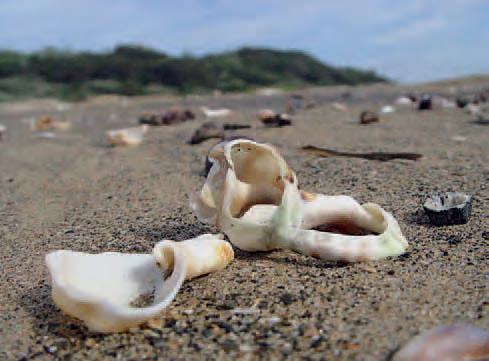
Shell debris on the Wild Coast Amble.
A resounding “No” to muscle cars on the beaches.
Under red skies beside a magnificent, glowering sea.
Pondoland is mostly made up of small villages with brightly painted thatched huts and cows with a proprietorial air.
The Transkei is arguably the poorest area in South Africa in terms of material wealth, yet possibly the richest in coastal wilderness.
A table and chairs made by the local community for the tourists who visit Umngazi River Bungalows.
The legendary Ben Dekker at one of his favourite spots.
Ben Dekker lives on the side of a steep seaside cliff just off Second Beach at Port St Johns, and looks just like Robinson Crusoe’s love child.
Ben, all two metres of him, has been just about everything but a fireman and a cowboy in his life: politician, actor, lumberman, master’s student, demon surf lover, castaway and local character. But he is mostly a roguish outlaw from The System we mere mortals are trapped in.
The first time we encountered him, Jules and I hid from Ben. Every journalist in the country seems to have written about him, and we thought we’d give the legend a miss.
But he made it almost impossible. Dressed in traditional headscarf, beaded waistcoat, leather flap over short-shorts that displayed a vast expanse of muscular thigh, he strode past us on the porch of Lily’s Lodge like a gaudy ship in full sail.
“Maybe tomorrow,” we said to each other, and lurked in the shadows, quaffing beer and cider, watching the circling frenzies of black bats.
I went into the pub called Ben’s Bar to get more drinks. The legend turned to me and said, “Take your lady and look at the full moon tonight”.
I did, and it was quite magnificent, that perfect orb of cratered blue cheese with its rainbow ring.
The next morning we ran into Ben on our way to town. He was dragging a piece of firewood. We formally introduced ourselves and made arrangements to meet later in the day. At exactly five p.m. we arrived at his cave just off Second Beach. Ben was working on a sneezewood sculpture. He made some tom off finding the “inner shape” in a piece of driftwood and settling it on a plinth and selling it as sea sculpture. I’d seen far worse in the northern suburbs galleries of Jo’burg.
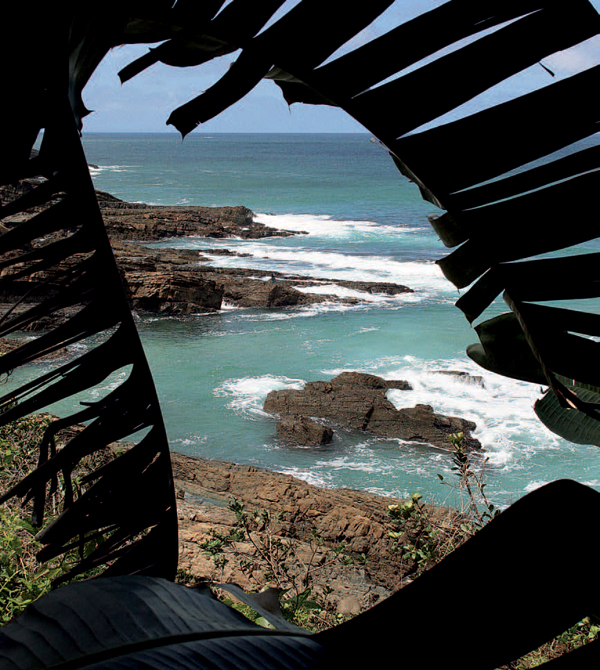
Ben’s ‘backyard’, framed by wild banana leaves.
The Wild Coast reveals her true beauty to those who explore it on foot.
He gave us each a goblet of Tassenberg Red and we discussed his latest river romp, which had landed Ben and one Loretta Toon in court on charges of public indecency. He smiled like the old rogue he really was.
“I was trying to save her from drowning.”
We continued our encounter up at Lily’s at dinner time, where we had juicy filleted kob. Ben wandered through from the kitchen bearing a large plate loaded with umngqusho, laced with calamari and crayfish sauce. We admired his magnificent beaded waistcoat. The hippie in me shoved my inner yuppie out of the way and really wanted one as well.
“Gail at Pondo People (a local craft shop) gives me a new waistcoat every year on my birthday,” he said.
“And what happens to the old one?”
“They go to a current lovely lady,” was all he’d say. How could the magistrate fine such a discreet gent R200 for public indecency? It didn’t seem right.
That was all back in 2002. Three years later we are at his door (so to speak) again. But he isn’t home. Instead, there is a note on the window of his tiny wooden shack that reads:
“Sergeant Naidoo – I waited until 11.30. Now what?”
We drive back to Port St Johns to look for Ben, but we don’t have to go far. There, on the dirt road, is the incredibly tall, loping figure of Mr Dekker. We stop, re-introduce ourselves and offer him a lift to town. He says he remembers us and is happy for the ride. Jules opens the back door of the Isuzu for him.
I think Ben has climbed into the bakkie, so I drive off, but in fact Ben is just starting to fold his massive frame into the small crawlspace (which is all the backseat of a 2003 Isuzu bakkie really amounts to) as I pull off in first gear, nearly damaging the man seriously. I am very sorry. Ben is very gracious.
“Good grief,” I later gasp at Jules. “I nearly killed the icon of Port St Johns.”
The big news of this visit is that Ben has just turned 65 and is eligible for a state pension.
“Which is great,” he enthuses. “Now, once a month, I can go stand in a queue with all my friends and get some money.”
Ben is obsessed with helping the local AIDS orphans and is teaching them how to be self-sufficient. He’s thrown himself into returning yet another hillside to nature, and has strategically planted some indigenous trees and shrubs that will soon conquer the over-grazed grasses.
He has also discovered the dangerous joys of self-publishing and can occasionally be spotted using a photocopier at a local newspaper, running off editions of his thoughts.
Ben Dekker is a well-travelled philosopher and you ignore his point of view at your peril. But there is also mischief in the man. Standing just near his excellent outdoor toilet (one of the finest loo-views in the world), Ben points at a distant cave.
“About a year after 9/11, I started a rumour that this was Osama Bin Laden’s hideout. Not long after that, the CIA came to have a look.”
We ask him why he likes to live next to the sea.
A rustic tin shanty in the middle of Port St Johns.
“The accessibility of a huge bath. The rhythm of it. And all that seafood ...”
After a long, thoughtful conversation with Ben, Jules and I head back towards the N2 road, and discuss the changes we’ve seen and heard about along the Wild Coast. There has been a temporary lull in the uproar after central government announced it wanted to reposition the N2 road closer to the coast. The project had thown up a small tsunami of horror and protest because roads bring development, and the new N2, said conservationists, would bring about the destruction of unique habitats and plant species.
We’ve heard whispers of bad news about Mkambati, a jewel of a nature reserve further north. Wilderness Safaris and the Mantis Collection had been granted concessions to develop low-impact lodges at Mkambati Nature Reserve some years previously, and everyone had rejoiced at the prospect of responsible, low-impact tourism coming to the area at last.
But the then Eastern Cape Tourism and Economic Affairs minister, later fired, had stonewalled all tourism development, and tied the deal up so tight in red tape and delays that it couldn’t move. As a result, Wilderness Safaris, which specialised in community partnerships and low-environmental-impact lodges, reluctantly pulled out.
Newspapers reported that members of the Mkambati Land Trust, representing 40 000 villagers who were to benefit, were incandescent with rage. The collapse of the deal cost surrounding communities a loss of R50 million investment in their land, a 46 per cent share of net profits from the planned lodges, a new clinic and a children’s educational camp, and hundreds of jobs, a vegetable-growing project and other enterprises. This in an area so poor that 3 per cent of children are mentally retarded by the time they are 10 because of malnutrition.
Central government tried to help, but to no avail. Wilderness Safaris took their money to Zambia instead, leaving the unique seascapes, landscapes and people of the old Transkei that much more vulnerable.
But we also hear cautious optimism about a few changes in some parts, especially in Coffee Bay. It appears that the European Union has invested more than eighty million rand in various projects to bring in community part-ownership, enabling various tourism assets to be refurbished and developed. There have been successes and there have been failures. But no one is giving up yet.
If tourism fails up here, then mining will win. It’s that simple. A northern stretch of the Wild Coast is particularly rich in ilmenite (and you’ll hear more about this later) and a massive prospecting company from Australia is waiting in the wings.
Pitting the short-term wonders of mining against the long-term benefits of tourism is like bringing a duck to a dog fight. Even before the first round is announced, you know who’s going to win, right? Well, maybe.
The only victorious duck we’ve ever heard of is up in St Lucia, the home of yet more ilmenite. Maybe there is hope. – Chris
During winter, the sardine migration (run) northwards sometimes fills bays like this with thousands of dolphins in hot pursuit, along with orca whales, seabirds and sharks.
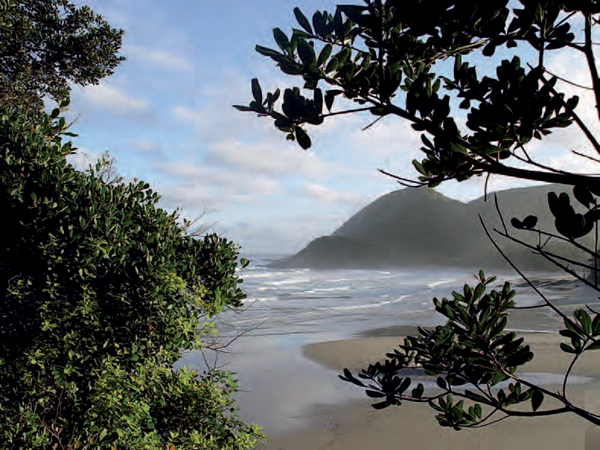
Second Beach at Port St Johns – one of the most beautiful in South Africa.
We ask him why he likes to live next to the sea. “The accessibility of a huge bath. The rhythm of it. And all that seafood ...”
A vegetable seller, with one of the “gates” of Port St Johns in the background.
If tourism fails up here, then mining will win. It’s that simple.
Hotels buy vegetables directly from the rural women.
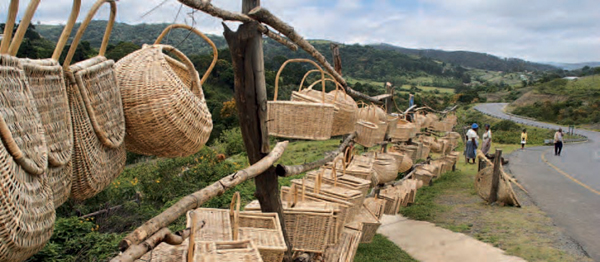
The road to Lusikisiki and Mbotyi River Lodge is an interesting shopping experience.
To get to the village of Mbotyi, you have to drive through the peaceful haven of the deep green Magwa Tea Plantation on a road lined with stately blue gums.
The tea fields give way to the Mbotyi State Forest, verdant, dark and mysterious. The road winds down to the village, through trees and dripping vegetation.
Mbotyi River Lodge is a leader in the field of responsible tourism, because of the tangible benefits it has brought to the local community in its recent past.
This is where the straggling, haggard survivors of an East Indiaman called the Grosvenor would have passed in August 1782. They had no gunpowder and their captain had lost all his spirit. They were easy pickings for the tribes living along the coast – only 18 of the original party of 123 made it back to safety.
More recently, the daring bank robber and former policeman André Stander used the village as a hideout while the rest of the country looked for him. Stander, son of a cop general, robbed as many as three banks on a good day. His fellow gangsters were eventually shot or captured. Stander himself was shot and killed by a Fort Lauderdale police officer in the USA.
We meet Jennifer Ludidi, the head housekeeper at the lodge. She remembers André Stander from his days as a policeman in Kokstad, and says she had no idea he was a fugitive from justice when he arrived one fine day in 1983. It was only when the police arrived, enquiring about a man wearing a wig, that she realised Stander was in trouble. She never saw him again.
She tells us the Tale of the Untaken Teaspoon.
In 1993, after the assassination of charismatic ANC leader Chris Hani, the area was in an uproar.
“It was in the month of August. So many people were toyi-toyiing (dancing in defiance). The guests departed in a hurry.
“We made the beds, we laid the tables, but the hotel was closed.”
Two watchmen were appointed and the hotel remained as it was, trapped in political aspic for eight years.
The locals in Mbotyi went through lean times of diminished income. They occasionally sold a crayfish tail to one of the white people brave enough to spend a holiday at a local cottage.
“But during that all those years, not a window was broken, not a teaspoon was taken.” – Chris
Children play in the lagoon at Mbotyi.